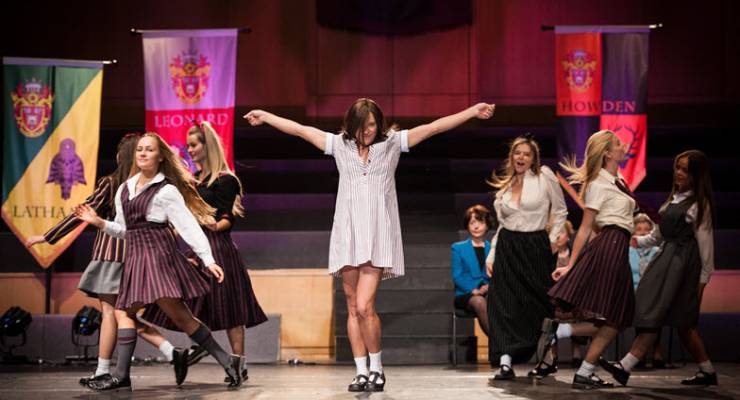
Oh dear. Last weekend Chris Lilley reminded the world that he existed and … it didn’t end well. In fact, it was all kinds of awful. With the comedian having recently garnered media attention in the wake of his most recent series, Jonah From Tonga, being axed from Maori Television, the publicity wing of Lilley’s flailing one-man empire decided on a somewhat unusual strategy to restore public favour.
He decided to — and as they say, you couldn’t write this — upload a video on his Instagram account called “Squashed N**ga”. It contained vision of himself in blackface (as one of his characters, the rapper S.mouse) as well as images of a person lying on the road after being run over.
It’s hard to imagine this kind of video ever being well received, let alone at the end of a week marked by protests around in the country following the controversial verdict handed down to the killer of 14-year-old indigenous teenager Elijah Doughty. Lilley yanked his offensive video and issued a short sort-of apology, explaining it was “not connected in any way to current news stories”.
Many people had stopped watching Chris Lilley by the time Jonah From Tonga, a ratings disaster for the ABC, arrived. However, much of his work — including We Can Be Heroes and Summer Heights High — remains vivid in the collective memory. These shows are relatively recent, after all, airing in 2005 and 2007 respectively.
But one of the comedian’s most offensive performances seems to have been completely forgotten about. Disappearing like morning mist, as if it had only existed in a dream.
Rewind to the Logies in 2006. Lleyton and Bec Hewitt famously lugged their baby daughter Mia to the podium, but that stage-planned moment turned out to be, against all odds, far from the greatest cringe-inducing stunt at the ceremony. For a musical segment, Lilley appeared in a neck-to-toe, jumpsuit-like, brown-skinned costume — a kind of full-body blackface.
With a prop spear in one hand and prop boomerang in the other, he performed a routine for which the words “extremely crude” hardly begin to cut it. “I am walkabout man, wise Aborigine,” Lilley opened with. It got worse.
The comedian led into Indigeridoo, a song with lyrics such as “Aborigine me / Aborigine you / We’re not just the people who eat kangaroo.” Adding another, er, layer, Lilley sang it all in a Chinese accent (the voice of another of his characters, physics student Ricky Wong) because what the hell — why not make it even more offensive?
Yes indeed: my memory of this felt too surreal, too weird, as if it had been somehow implanted. The entire sorry routine is nevertheless available on YouTube.
It is surely unthinkable that the Logies would entertain the idea of broadcasting such material now. But the ceremony in question wasn’t the dark old ages of Australia; it was little more than a decade ago. Could the country really have changed that much in 11 years?
The passage of time has made it easier to discern the things that are wrong with Lilley’s shtick. His once-dazzling, chameleon-like performance style went some way in masking those racist, classist, graceless undertones. He almost always punches down, belittling people who have enough to be wary of (to say the least) insofar how they are treated in media representations and society more broadly.
But perhaps Lilley’s fundamental flaw comes down to a matter of emphasis. The performer fails to implement the one thing that might have saved him, or at least made his shtick in some way intellectually valuable. That is, to invert the joke-making process so the comedy is hinged not at the expense of his characters (and the real-life people they are supposed to represent) but on how people respond to them — and what their responses say about the world we live in.
Consider Sacha Baron Cohen’s famous, decorum-obliterating Kazakh character Borat, a feral misogynist and rampant anti-Semite. In the many times when Borat has elicited support from real-life Americans for his disgusting antics — such as in his Throw the Jew Down the Well song, or the classic scene from the Borat movie when Cohen sings a mutated American anthem at a rodeo — the real outrage comes not from Cohen, but from the sincere zealousness of the people around him.
We know the comedian is horsing around, but the crowd’s response is frighteningly real. Cohen’s performance unquestionably exposes racism, just as it is unquestionably racist itself — comprised of what the actor considers to be distinctive cultural characteristics of Kazakhstan people.
This is dangerous terrain for any comedian. And, to be frank, probably not the sort of comedy anybody should be suggesting anyone make any more of. But at least with Sacha Baron Cohen and Borat, there are meaningful layers to the satire — even if the cost of getting them means being exposed to grotesque caricature.
In Lilley’s work there are either no satirical layers, or layers so wafer thin they cannot stand up to the slightest scrutiny. We are asked to laugh at the behaviour of the characters themselves. The things they say and do; even what they look like and how they speak.
In need of that necessary extra layer — the layer that says it is not OK to make fun of somebody on the basis of their race, class, disability etc. — the community have added it themselves, using the democratising force of social media as their primary means. That means the joke is now, finally, on Lilley.
Celebrity controversies come and go, but it’s hard to see a way out for a performer whose style is so one-note, so reliant on punching down, and, historically, so uninterested in pursuing an acting career outside of his own problematic creations. Ricky Wong, it seems, will never appear at the Logies again. And nobody will mourn his absence.








Dont blame him, its the fault of the ABC for ever letting him on air
I couldn’t care if it is racist, comedy is supposed to be edgy. Lilley is simply not funny. I never understood his appeal ten years ago and I don’t get it now.
I just clicked on the 2006 Logie’s link.
Oh, my sainted Grandmother, what the hell did I just watch?
Thanks for that youtube link Luke. It was hilarious satire.
As for Jonah from Tonga. Presumably you didn’t watch it because if you did you’d know that J was a sympathetic character. You can argue about the blackface stuff and call it racist I suppose but throwing labels around is easy, and the intent from Lilley is certainly not racist. The worst thing about S.mouse is that the character is not particularly funny and so the satire isn’t as effective. I think a lot of people who look at Lilley’s work don’t try and think too deeply about it.
“You can argue about the blackface stuff and call it racist…”
Correct, you can. You know, since it is and everything.
Sure thing. The answer is all so black and white eh?
Spot on.
You won’t get what he’s trying say if you watch a few minutes or even one episode. But if you want to be offended, you will poor baby.
Well, I could never understand why anyone ever thought he had the slightest hint of actual talent. There is very little humour there, and what there is is no higher grade than a primary school play, but at least they are put on by young kids.
I’d argue that there are no layers to his satire at all, and that it isn’t even satire, it’s just crass.
And thanks, but there’s no way I will be clicking on that link, your description made me cringe enough.
Quite
Agreed.
Racist, unfunny, boring git!!